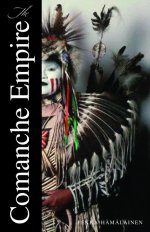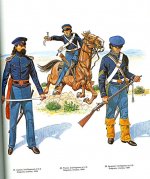PolarBear
Major
- Joined
- Feb 24, 2007
- Messages
- 6,706
Yale University has 2 recently published books that will provide very useful background information about the initial releases in the Real West series. These new figures provide an excellent opportunity to recreate the battles that took place in the 1840s involving the United States, Mexico, the newly created Republic of Texas and indigenous peoples including the Comanches.
The first is a book about those conflicts
War of a Thousand Deserts
Indian Raids and the U.S.-Mexican War
Brian DeLay
In this radically new account of America’s watershed victory in the U.S.-Mexican War, Brian DeLay uncovers the forgotten role of the Comanches and their native allies. For fifteen years, Indian raids devastated northern Mexico, precipitating key events and altering the history of the continent in enduring ways.
In the early 1830s, after decades of relative peace, northern Mexicans and the Indians whom they called “the barbarians” descended into a terrifying cycle of violence. For the next fifteen years, owing in part to changes unleashed by American expansion, Indian warriors launched devastating attacks across ten Mexican states. Raids and counter-raids claimed thousands of lives, ruined much of northern Mexico’s economy, depopulated its countryside, and left man-made “deserts” in place of thriving settlements. Just as important, this vast interethnic war informed and emboldened U.S. arguments in favor of seizing Mexican territory while leaving northern Mexicans too divided, exhausted, and distracted to resist the American invasion and subsequent occupation.
Exploring Mexican, American, and Indian sources ranging from diplomatic correspondence and congressional debates to captivity narratives and plains Indians’ pictorial calendars, War of a Thousand Deserts recovers the surprising and previously unrecognized ways in which economic, cultural, and political developments within native communities affected nineteenth-century nation-states. In the process this ambitious book offers a rich and often harrowing new narrative of the era when the United States seized half of Mexico’s national territory.
Brian DeLay is assistant professor of history, University of Colorado, Boulder. He lives in Boulder.
Reviews:
“Brian DeLay is one of the most articulate and original authors writing in the Western Americana field today.”—Howard R. Lamar, author of The New Encyclopedia of the American West
“With a good sense of drama and narrative, DeLay tells the story of how the interactions and preconceptions of Mexicans, Americans, and independent Indian tribes shaped the borderland region in ways none of the parties expected. This book will force many readers to rethink their basic assumptions about Indians as nineteenth-century political actors. This is not just the most significant work on the U.S.-Mexico War to appear in a generation, but a study with wide-ranging implications for the history of North America. Brian DeLay shows how enlightening transnational history can be when done well.”—Amy S. Greenberg, The Pennsylvania State University
“In supple prose, DeLay analyzes the interactions in the years leading up to the war among three ‘nations’—the struggling new Mexican republic, the confident and opportunistic (but also relatively new) U.S., and the older, highly dynamic peoples of indigenous America—as well as among the compellingly depicted individuals and groups that composed them.”—Margaret Chowning, University of California at Berkeley
"DeLay's*War of a Thousand Deserts*begins with a long-neglected question: what role did Indian Nations of the Southern Plains—Comanches, Kiowas, Apaches—play in the era of the U.S.-Mexican War? *His answers sweep across the borderlands in stories of violence, trauma, and the devastating cultural effects of endemic warfare on indigenous and Mexican peoples alike. A tireless researcher and gifted writer has given us a necessary, if profoundly disturbing, look at the history of our American West."—James F. Brooks, author of*Captives & Cousins: Slavery, Kinship, and Community in the Southwest Borderlands
“Brian DeLay’s compelling and well-documented narrative of a little-known subject—Indian raids into northern Mexico—offers new insights on the impact of those attacks on the affected countries and peoples.”—Pedro Santoni, author of Mexicans at Arms: Puro Federalists and the Politics of War, 1845-1848
"In War of a Thousand Deserts, Brian DeLay tells the fascinating—and long-forgotten—story of the savage, interethnic conflict between independent tribes, Mexicans, Texans and norteamericanos. . . . [DeLay] is an imaginative and resourceful researcher. . . .*Drawing on contemporary accounts by Mexicans and Texans, DeLay provides a sophisticated, speculative, and controversial account of the motivations of Indians."—Glenn Altschuler, Tulsa World
The first is a book about those conflicts
War of a Thousand Deserts
Indian Raids and the U.S.-Mexican War
Brian DeLay
In this radically new account of America’s watershed victory in the U.S.-Mexican War, Brian DeLay uncovers the forgotten role of the Comanches and their native allies. For fifteen years, Indian raids devastated northern Mexico, precipitating key events and altering the history of the continent in enduring ways.
In the early 1830s, after decades of relative peace, northern Mexicans and the Indians whom they called “the barbarians” descended into a terrifying cycle of violence. For the next fifteen years, owing in part to changes unleashed by American expansion, Indian warriors launched devastating attacks across ten Mexican states. Raids and counter-raids claimed thousands of lives, ruined much of northern Mexico’s economy, depopulated its countryside, and left man-made “deserts” in place of thriving settlements. Just as important, this vast interethnic war informed and emboldened U.S. arguments in favor of seizing Mexican territory while leaving northern Mexicans too divided, exhausted, and distracted to resist the American invasion and subsequent occupation.
Exploring Mexican, American, and Indian sources ranging from diplomatic correspondence and congressional debates to captivity narratives and plains Indians’ pictorial calendars, War of a Thousand Deserts recovers the surprising and previously unrecognized ways in which economic, cultural, and political developments within native communities affected nineteenth-century nation-states. In the process this ambitious book offers a rich and often harrowing new narrative of the era when the United States seized half of Mexico’s national territory.
Brian DeLay is assistant professor of history, University of Colorado, Boulder. He lives in Boulder.
Reviews:
“Brian DeLay is one of the most articulate and original authors writing in the Western Americana field today.”—Howard R. Lamar, author of The New Encyclopedia of the American West
“With a good sense of drama and narrative, DeLay tells the story of how the interactions and preconceptions of Mexicans, Americans, and independent Indian tribes shaped the borderland region in ways none of the parties expected. This book will force many readers to rethink their basic assumptions about Indians as nineteenth-century political actors. This is not just the most significant work on the U.S.-Mexico War to appear in a generation, but a study with wide-ranging implications for the history of North America. Brian DeLay shows how enlightening transnational history can be when done well.”—Amy S. Greenberg, The Pennsylvania State University
“In supple prose, DeLay analyzes the interactions in the years leading up to the war among three ‘nations’—the struggling new Mexican republic, the confident and opportunistic (but also relatively new) U.S., and the older, highly dynamic peoples of indigenous America—as well as among the compellingly depicted individuals and groups that composed them.”—Margaret Chowning, University of California at Berkeley
"DeLay's*War of a Thousand Deserts*begins with a long-neglected question: what role did Indian Nations of the Southern Plains—Comanches, Kiowas, Apaches—play in the era of the U.S.-Mexican War? *His answers sweep across the borderlands in stories of violence, trauma, and the devastating cultural effects of endemic warfare on indigenous and Mexican peoples alike. A tireless researcher and gifted writer has given us a necessary, if profoundly disturbing, look at the history of our American West."—James F. Brooks, author of*Captives & Cousins: Slavery, Kinship, and Community in the Southwest Borderlands
“Brian DeLay’s compelling and well-documented narrative of a little-known subject—Indian raids into northern Mexico—offers new insights on the impact of those attacks on the affected countries and peoples.”—Pedro Santoni, author of Mexicans at Arms: Puro Federalists and the Politics of War, 1845-1848
"In War of a Thousand Deserts, Brian DeLay tells the fascinating—and long-forgotten—story of the savage, interethnic conflict between independent tribes, Mexicans, Texans and norteamericanos. . . . [DeLay] is an imaginative and resourceful researcher. . . .*Drawing on contemporary accounts by Mexicans and Texans, DeLay provides a sophisticated, speculative, and controversial account of the motivations of Indians."—Glenn Altschuler, Tulsa World









